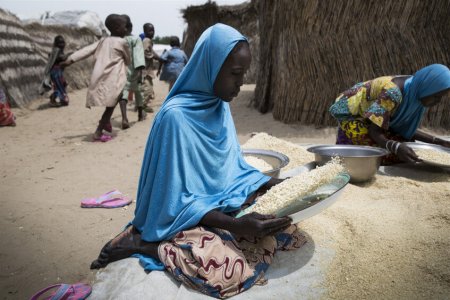
People who fled their homes and lost their livelihoods due to the ongoing conflict in the North-East of Nigeria struggle to put food on the table because of soaring inflation. The inflation rate reached a four-year record high of 18per cent in March this year, according to the National Bureau of Statistics. People displaced by the conflict are among the most vulnerable and are disproportionally affected by price fluctuations.
“Before the prices of things were acceptable. Since they increased, everything has become expensive. And since I sell my merchandise in the camp, I know these people are displaced, the price cannot be the same, as I have to take their situation into consideration,” says Ali Kolomi, who has been displaced with his family of nine, and now runs a grocery shop in one of the camps for displaced people in Maiduguri, the capital of Borno state
Over a decade of armed conflict has left more than two million people displaced in the North-East of Nigeria, making it one of the world’s most complex humanitarian emergencies. As people fled their homes, they also lost their livelihoods and many of them struggle to meet their essential needs.
“Beyond the physical safety, people also have steadily and increasingly been struggling securing basic livelihood. Families struggle to find work, care for their loved ones, but also put food on the table.” said Sarrah El Moumouhi, deputy head of Maiduguri sub-delegation for the International Committee of the Red Cross (ICRC).
According to official statistics, 40 per cent of Nigeria’s population, or almost 83 million people, live below the country’s poverty line of 137,430 naira ($382) per year. The ICRC provides microeconomic grants to vulnerable groups of people who lost their income due to the ongoing armed conflict to enable people to start small businesses. However, steep inflation of the past year has hit them hard and an increasing number of people are struggling to keep their business afloat.
SOURCE: ICRC